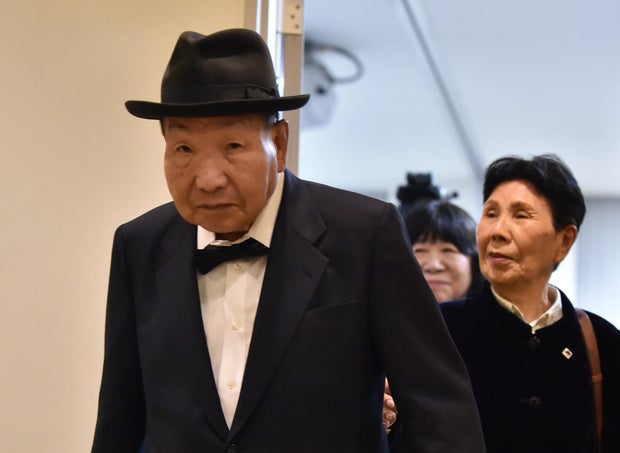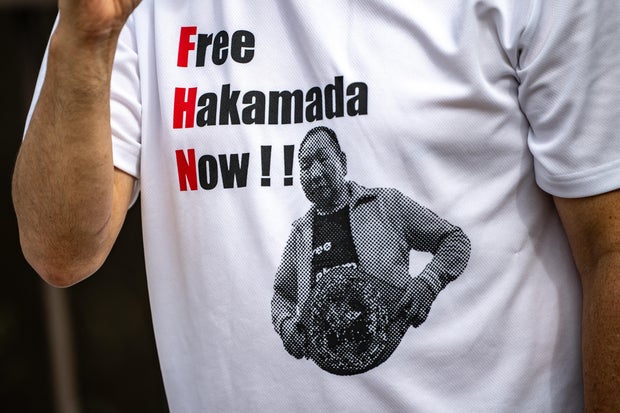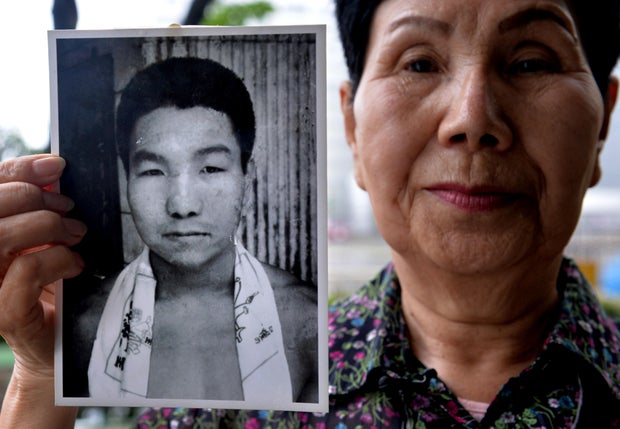A Japanese court ruled Thursday that an 88-year-old former boxer was not guilty in a retrial for a 1966 quadruple murder, reversing an earlier decision that made him the world’s longest-serving death row inmate.
Iwao Hakamada’s acquittal by the Shizuoka District Court makes him the fifth death-row convict to be found not guilty in a retrial in postwar Japanese criminal justice. The case could rekindle a debate around abolishing the death penalty in Japan.
The court’s presiding judge, Koshi Kunii, said the court acknowledged multiple fabrications of evidence and that Hakamada was not the culprit, Hakamada’s lawyer said.
After the two-hour full explanation of the ruling that followed the main sentencing, his 91-year-old sister Hideko Hakamada walked out of the courthouse with a big smile, welcomed by burst of cheers and two big bouquets to celebrate the acquittal of her brother after the 58-year legal battle.
KAZUHIRO NOGI/AFP via Getty Images
“Thank you everyone, (the victory) is thanks to your support,” she said. “Thank you very much for supporting us for such a long time.”
Hakamada was convicted of murder in the 1966 killing of a company manager and three of his family members, and setting a fire to their central Japan home. He was sentenced to death in 1968, but was not executed due to lengthy appeals and the retrial process in Japan’s notoriously slow-paced criminal justice system where prosecutors have 99% conviction rate.
He spent 48 years behind bars – more than 45 of them on death row – making him the world’s longest-serving death row inmate, according to the Amnesty International.
“We are overjoyed by the court’s decision to exonerate Iwao Hakamada,” Amnesty International’s Boram Jang said in a statement. “After enduring almost half a century of wrongful imprisonment and a further 10 years waiting for his retrial, this verdict is an important recognition of the profound injustice he endured for most of his life.”
It took 27 years for the top court to deny his first appeal for retrial. His second appeal for a retrial was filed in 2008 by his sister. Hakamada was released from prison in 2014 when a court ordered a retrial based on evidence suggesting his conviction was based on fabricated accusations by investigators, but he was not cleared of the conviction. He was allowed to await retrial at home because his frail health and age made him a low risk for escape. Then, in 2023, the court finally ruled in his favor, paving the way for the latest retrial that began in October.
“I have nothing to do with the case … I am innocent,” he wrote in his letter to his mother while on trial in 1967. He apologized for troubling the family and relatives, but expressed confidence in proving his innocence.
After the death sentence, he expressed fear of death and anger at being falsely accused.
“When I go to sleep in soundless solitary cell every night, I sometimes cannot help cursing God. I have not done anything wrong,” he wrote to his family. “What a cold-blooded act to give me such cruelty. We don’t need such God. I’m tempted to shout this to God,” Hakamada wrote in one of his letters.
Hakamada, whose Christian name is Paulo, was invited to a Mass in Tokyo during Pope Francis’ visit in 2019, five years after his release.
PHILIP FONG/AFP via Getty Images
Supporters say Hakamada’s nearly half-century detention took a toll on his mental health. The first two months after Hakamada’s release, he kept pacing around inside the apartment, without even trying to go outside, his sister said. Most of his 48 years behind bars was spent in solitary confinement, in fear of execution.
One day, Hakamada’s sister asked him to help her with groceries to get him to agree to leave the house. Going out for a walk then became his daily routine, though today he is less able and he goes out by car, assisted by his supporters.
At a final hearing at the Shizuoka court in May before Thursday’s decision, prosecutors again demanded the death penalty, triggering criticism from rights groups that prosecutors were trying to prolong the trial.
The extremely high hurdles for retrials have also prompted legal experts to call for a revision to the system.
During the investigation that followed his arrest, Hakamada initially denied the accusations, then confessed. He later said he was forced to confess under violent interrogation by police.
A major point of contention was five pieces of blood-stained clothing that investigators claimed Hakamada wore during the crime and hid in a tank of fermented soybean paste, or miso. The clothes were found more than a year after his arrest.
A Tokyo High Court ruling in 2023 acknowledged scientific experiments that clothing soaked in miso for more than a year turns too dark for bloodstains to be spotted, noting a possible fabrication by investigators.
Defense lawyers and earlier retrial decisions said the blood samples did not match Hakamada’s DNA, and trousers that prosecutors submitted as evidence were too small for Hakamada and did not fit when he tried them on.
“Groundbreaking” ruling
On Thursday, the Shizuoka court judge concluded that clothing soaked in miso for more than a year would never show red blood stains, upholding the experiments submitted by the defense lawyers and calling it an “inhumane investigation” that led to forced confessions.
Ogawa, Hakamada’s lawyer, praised the ruling as “groundbreaking” for clearly stating that the prosecution fabricated key evidence at the beginning. “I believe this ruling puts an end to the case. … Now we must prevent prosecutors from appealing no matter what.”
The lawyer said he planned to go to the district prosecutors to demand they not appeal the case, as it is technically possible to do so even though they have nothing left to make the case.
KAZUHIRO NOGI/AFP via Getty Images
Japan and the United States are the only two countries in the Group of Seven advanced nations that retain capital punishment. A survey by the Japanese government showed an overwhelming majority of the public support executions.
Executions are carried out in secrecy in Japan and prisoners are not informed of their fate until the morning they are hanged. In 2007, Japan began disclosing the names of those executed and some details of their crimes, but disclosures are still limited.
According to Amnesty International, as of Dec. 31, 2023, 107 out of the 115 people on death row had their death sentences finalized and “those on death row continued to be held in solitary confinement.”
Hideko Hakamada has devoted around half of her life to win her brother’s innocence. Before Thursday’s ruling, she said she was in a never-ending battle.
“It is so difficult to get a retrial started,” She told reporters in Tokyo. “Not just Iwao, but I’m sure there are other people who have been wrongly accused and crying. … I want the criminal law revised so that retrials are more easily available.”
Last month, a city in Oklahoma agreed to pay more than $7 million to a former death row inmate who was exonerated after nearly 50 years in prison, making him the longest-serving inmate to be declared innocent of a crime in the U.S.
Source link


